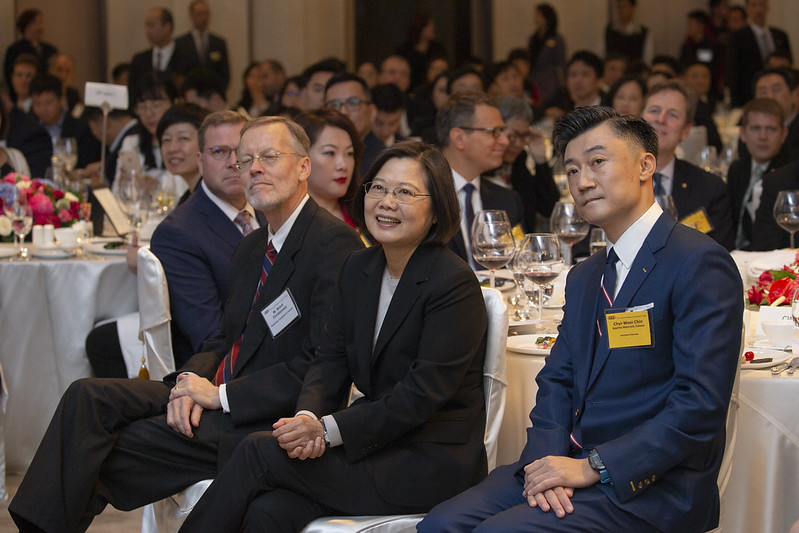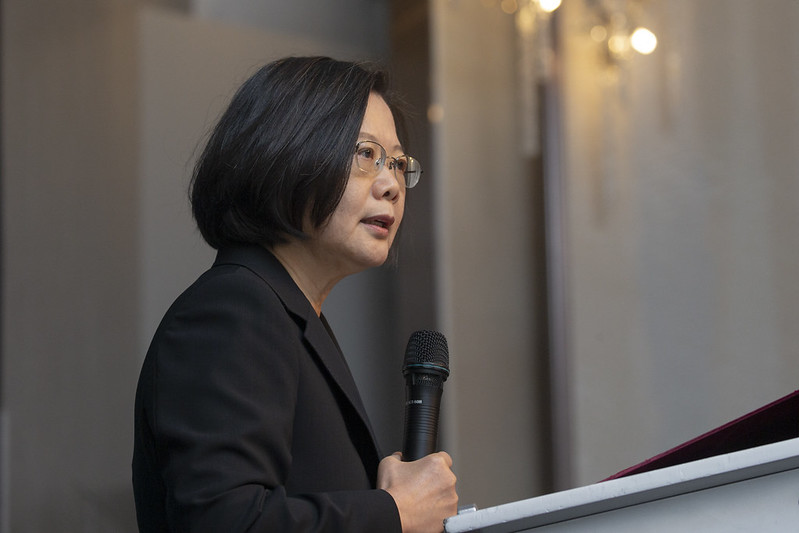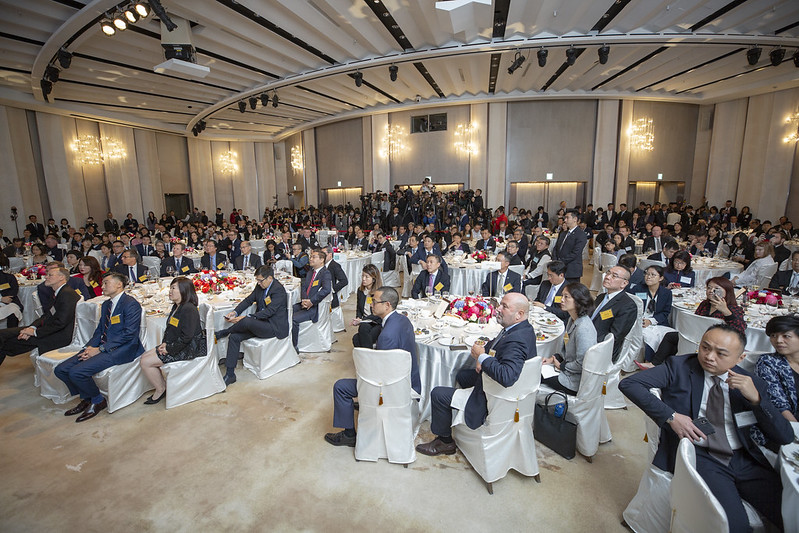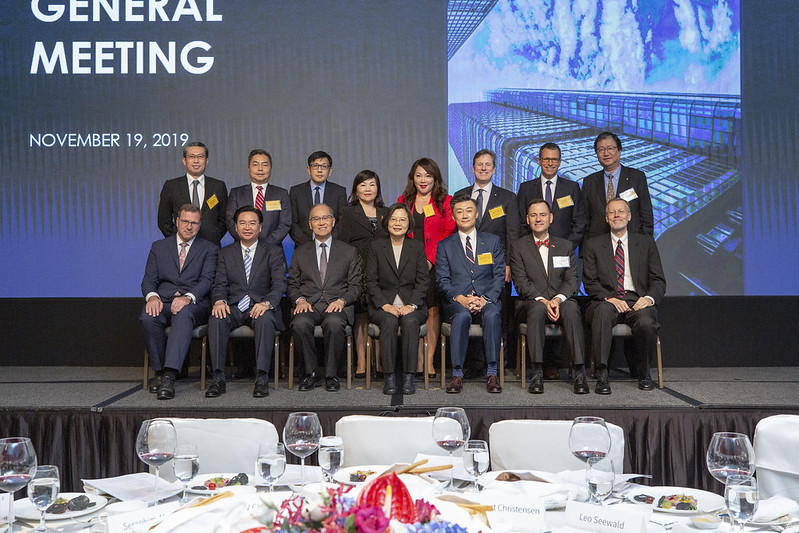News & activities
 News releases
News releases
President Tsai Ing-wen attended the 2019 American Chamber of Commerce Taipei (AmCham) Annual General Meeting at noon on November 19. She stated that the government will work towards a new and improved version of the Taiwanese economic development model, transforming Taiwan into Asia's high-end manufacturing and R&D center, a regional financial and wealth management center, and a base for high-quality talent. The president also expressed hope that AmCham will continue to support the signing of a bilateral trade agreement between Taiwan and the US, so that we can work together to spur growth, foster innovation, and bring greater economic prosperity to more people.
A transcript of President Tsai's remarks follows:
Thank you. It is always great to be back at the American Chamber of Commerce.
I trust that my good friend Director Christensen [American Institute in Taiwan Taipei Office Director William Brent Christensen] will agree with me that since AmCham Taipei's establishment 68 years ago, every single one of the Chamber's members has played a significant role in Taiwan's economic development.
For instance, when I received an AmCham delegation led by former Chairperson Leo Seewald in September, Prudential CEO Dylan Tyson told me that his company has been operating in Taiwan for over 30 years. I trust there are many companies like Prudential that have stood by Taiwan for decades.
I also want to take a moment to congratulate AmCham members on taking home seven out of ten of the first-ever "Economic Contribution Awards for Foreign Companies in Taiwan" at this year's Taiwan Business Alliance Conference. These companies recognize Taiwan's potential and importance, and they have confidence in the future of this market.
And like I said during this year's Hsieh Nian Fan: This year is a good year. It is an optimistic year. And it is an engaging year.
Despite many challenges, this year has proven to be a good year, and an optimistic year as well.
Without a doubt, the changing world economic order, especially the US-China trade war, has had a major impact on the global economy. Countries around the world are struggling to adjust.
And although AmCham's 2019 Business Climate Survey reflects these challenges and uncertainties, major US companies also highlighted Taiwan's innovation, talented workforce, and potential for market expansion.
These advantages are no coincidence. They are the result of Taiwan's freeness and openness, which has allowed good talent to thrive, as well as our respect and protection for intellectual property rights.
Even more encouraging is the fact that we are beginning to see results from our hard work over the past three years.
For three years, we have worked to develop a new economic development model for Taiwan. We have reduced our overdependency on production bases in China.
We have strengthened our partnerships with the US and other major economies. We have begun to change our overall economic structure and encouraged industrial innovation.
This transformation has made Taiwan's economy both resilient and responsive. More than that, it has given us the ability to overcome the many challenges facing us in the global economy.
The entire world is watching Taiwan's economic transformation. For the first three quarters of this year, our economic growth topped the Four Asian Dragons. And our future outlook is even more optimistic.
We are seeing more Taiwanese firms returning to invest in Taiwan than ever before. Our government has already approved nearly NT$700 billion in investment applications, with the potential to bring more than 55,000 high-quality jobs back to Taiwan.
Taiwanese firms and individuals are expected to bring billions of US dollars in overseas capital back to Taiwan with them. We estimate this trend will continue and accelerate.
Foreign companies are bullish on Taiwan as well. In the coming years, we expect to see billions in new investments from international companies. And major US firms like Google, Microsoft, Micron, and Amazon Web Services will bring thousands of high-paying jobs.
We are also seeing positive developments in Taiwan's economic makeup. From January to October of this year, Taiwan's exports to the US increased by 17.7%, while our exports to China decreased by 6.65%. This change reflects the swift changes and adjustments in the supply chain of US-China-Taiwan trade.
These changes are pushing Taiwan into a new era of economic development. Here, to all Taiwanese companies, and foreign companies that are investing or would like to invest in Taiwan: as we enter this new era, I want to assure you that we will work even harder to take Taiwan's economy to new heights.
We will work towards a new and improved version of the Taiwanese economic development model. This model will build on the strong foundation we have built over the past three years.
It will be adaptive to changes in the global supply chain and capital flow. It will incorporate the recent wave of investments by Taiwanese and international firms, as well as the massive amounts of capital currently flowing back to Taiwan.
This model will transform Taiwan into Asia's high-end manufacturing and R&D center, a regional financial and wealth management center, and a base for high-quality talent.
This combination of industrial, capital, and talent advantages will provide Taiwan with a new path forward for the next 20 years of economic prosperity.
In building on our current momentum, this year has also been an engaging year.
Taiwan and the US have long been partners in both global trade and regional security. We share the same values and responsibilities, as well as the same interests.
AmCham has always played a key role in advancing Taiwan-US trade relations, and in bringing new investments to Taiwan. The Chamber also helps to remove many obstacles for US companies investing and operating in Taiwan. We listen closely to the suggestions of AmCham members, and respond to your concerns, too.
For instance, this past August, we implemented a Patent Linkage System that exemplifies our commitment to IP protection, as well as our support for research and innovation.
In fact, we have been working to improve Taiwan's regulatory environment across the board. We have amended outdated regulations to allow greater flexibility in business management and efficient use of workforce.
We have adjusted a number of regulations to make it easier for foreign talent to live and work in Taiwan. And we have relaxed regulations on work hours for foreign professionals in supervisory and technical positions to better reflect the demands of a knowledge-based economy. We are also continuing to search for new ways to increase our engagement with the US and spur further economic cooperation.
This month, we officially launched the Talent Circulation Alliance (TCA) in collaboration with the American Institute in Taiwan. This initiative was announced by Director Christensen himself back in April, and I want to take a moment to thank him for working with us to make this project a reality.
The TCA will help young tech talent move more freely between Taiwan and the US, and spark innovative collaboration across many fields.
I know that AmCham also recently launched the NextGen Business Leaders Program, so that we can begin training the leaders of tomorrow today. Clearly, we share the same goals when it comes to talent development.
I want to reiterate that Taiwan and the US share strategic goals for economic development, and we must work together to achieve them. A central aim of the Trump administration is to revitalize the concept of "Made in the USA."
Taiwan is also searching for a new position in the global supply chain, and working to create new modes of production and manufacturing.
Taiwan and the US share strong ties in the ICT, semiconductor, automotive, and aerospace industries. I hope that in the future, we can extend this strategic cooperation to cutting-edge manufacturing, particularly in the digital economy, AI, IoT, and Industry 4.0.
And to strengthen our cooperation in these areas, we need an arrangement that guarantees the supports from the governments; one that will allow companies to invest with confidence.
Without a doubt, signing a bilateral investment agreement should be number one priority of ours.
I know that when former Chairperson Seewald led the 2019 CEO Mission to Washington, D.C., he expressed strong support for a bilateral trade agreement (BTA) between our countries.
A high-quality BTA between our countries would not only help strengthen our engagement, it would also set a strong precedent for a rules-based trade order in the Indo-Pacific region. So I hope you will continue to support this effort.
Truly, the relationship between Taiwan and AmCham Taipei is one of mutual support. We are both working to achieve the same goals: that is to spur growth, foster innovation, and bring greater economic prosperity to more people.
I want to thank all of you once again for making this year so good, so optimistic, and so engaged, even in the face of the challenges before us. Working together, I'm confident that we can make next year an even better one. Thank you.
Also present at the event were AmCham Taipei Chairman Chyi-Woei Chin, President William Foreman, AIT Taipei Office Director William Brent Christensen, National Security Council Secretary-General David T. Lee (李大維) and Foreign Minister Joseph Wu (吳釗燮).












